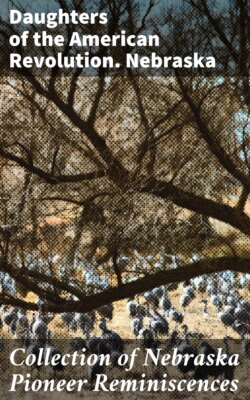Читать книгу Collection of Nebraska Pioneer Reminiscences - Daughters of the American Revolution. Nebraska - Страница 22
На сайте Литреса книга снята с продажи.
By Ella Pollock Minor
ОглавлениеTable of Contents
Mr. and Mrs. Jacob Vallery were living in Glenwood, Iowa, in 1855, when they decided to purchase a store from some Indians in Plattsmouth. Mr. Vallery went over to transact the business, and Mrs. Vallery was to follow in a few days. Upon her arrival in Bethlehem, where she was to take the ferry, she learned that the crossing was unsafe on account of ice floating in the river. There were two young men there, who were very anxious to get across and decided to risk the trip. They took a letter to her husband telling of the trouble. The next day, accompanied by these two young men, Mr. Vallery came over after her in a rowboat, by taking a course farther north. The boat was well loaded when they started on the return trip. Some of the men had long poles, and by constantly pushing at the ice they kept the boat from being crushed or overturned.
Mrs. Vallery's oldest daughter was the third white child born in the vicinity of Plattsmouth. And this incident happened soon after her arrival in 1855. Mrs. Vallery had the baby in a cradle and was preparing dinner when she heard a knock at the door. Before she could reach it, an Indian had stepped in, and seeing some meat on the table asked for it. She nodded for him to take it, but he seemed to have misunderstood, and then asked for a drink of water. While Mrs. Vallery was getting the drink, he reached for the baby, but she was too quick for him and succeeded in reaching the baby first. He then departed without further trouble.
At one time the Vallerys had a sick cow, and every evening several Indians would come to find out how she was. She seemed to get no better and still they watched that cow. In the course of a week she died, evidently during the night, because the next morning the first thing they heard was the Indians skinning the cow, out by the shed, and planning a "big feed" for that night down by the river.
The late Mrs. Thomas Pollock used to tell us how the Indians came begging for things. Winnebago John, who came each year, couldn't be satisfied very easily, so my grandmother found an army coat of her brother's for him. He was perfectly delighted and disappeared with it behind the wood pile, where he remained for some time. The family wondered what he was doing, so after he had slipped away, they went out and hunted around for traces of what had kept him. They soon found the clue; he had stuffed the coat in under the wood, and when they pulled it out, they found it was minus all the brass buttons.
Another time one of Mrs. Pollock's children, the late Mrs. Lillian Parmele, decided to play Indian and frighten her two brothers, who were going up on the hill to do some gardening. She wrapped up in cloaks, blankets and everything she could find to make herself look big and fierce, then went up and hid in the hazel brush, where she knew they would have to pass. Pretty soon she peeked out and there was a band of Indians coming. Terrified, she ran down toward her home, dropping pieces of clothing and blankets as she went. The Indians seeing them, ran after her, each one anxious to pick up what she was dropping. The child thinking it was she they were after, let all her belongings go, so she could run the better and escape them. After that escapade quite a number of things were missing about the house, some of them being seen later at an Indian camp near by.
